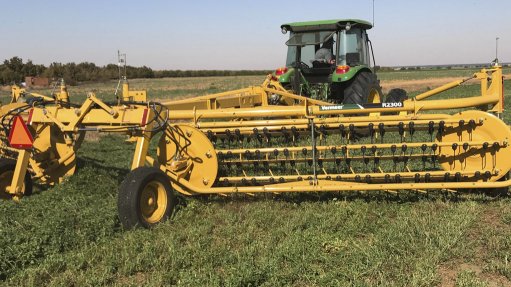
BETTER FEED The Vermeer R2300 basket rake ensures a cleaner forage, increasing the production value of dairy and beef cattle
Forward-thinking livestock farmers who are willing to embrace the use of new equipment in their operations will forge a way forward amid the economic and ecological hardships facing South Africa’s agriculture industry, says Johannesburg-based industrial equipment provider Vermeer Equipment Suppliers MD Frank Beerthuis.
He notes that drought has led to a shortage of feed for livestock, especially in the Cape provinces, and increased input costs and low yields are resulting in reduced operational profits – or sometimes operational losses – at livestock farms across the country. In addition, the depressed economic climate and political uncertainty are making farmers reluctant to invest in solutions that could combat these challenges.
“Unfortunately, we are, thus, seeing farmers postpone investments in the equipment needed to improve their operations. There is also an ongoing trend of smaller-scale farmers divesting their noncurrent assets and relying solely on the service of contractors to carry out fieldwork.”
Larger scale and particularly more forward-thinking farmers are, however, eager to investigate ways of improving operating efficiencies and increasing production. Vermeer has seen increased interest from this section of the market in its range of powered basket rakes, round balers and bale processors to mechanise the feeding of large size bales. It also sees increasing interest in its product line of large round balers for cornstalk baling.
Developed by Vermeer’s US-based manufacturing plant, Beerthuis explains that the R2300 series of powered basket rakes prevent dirt and soil from being mixed into the crop before baling. Being ground driven, their predecessors – traditional carted wheel rakes – pose a significant risk of soil contamination, which reduces the quality of the forage crop. The cleaner and more tasteful forage produced by the R2300 series increases the appetite of animals and leads to a higher production of dairy and beef cattle.
“We have received a lot of interest in this product since it was introduced to the South African market at Nampo, an agricultural trade show held in May. The first units have been retailed and are successfully being used in the harvest of lucerne crop at a farm near Hoopstad, in the Free State.”
Also introduced at Nampo were Vermeer’s BPX and FPX series of large bale processors, which mechanise the handling of large bales that are otherwise cumbersome to manage. Beerthuis points out that a single person can load the bales into these machines and then direct the output to feed animals, or use it for bedding. The technology works particularly well in open fields and in feedlots and Vermeer anticipates that the first machines will be retailed within the next three months.